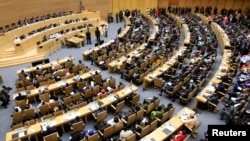ADDIS ABABA —
Uganda says it will not fully withdraw its forces from South Sudan, despite concerns their continued presence is complicating efforts to bring peace to the country. Uganda’s role in the conflict is under scrutiny at the African Union summit in Addis Ababa.
Uganda’s military has taken credit for helping to stop rebel forces in South Sudan, and for recapturing the city of Bor, north of the capital.
But a cease-fire deal signed last week between South Sudan’s government and the rebels calls for the progressive withdrawal or redeployment of allied forces in the country.
Speaking after a heads of state meeting of the East African regional group IGAD on the sidelines of the AU summit Friday, Ugandan Foreign Minister Sam Kutesa said his country’s forces are not withdrawing from their positions in South Sudan.
“No, we have stayed where we are. Actually we are not advancing ourselves, we just stopped the rebels from advancing southwards, but it’s the government that has been fighting,” he said.
Uganda initially sent troops into the country at the invitation of the South Sudanese government in December, after fighting broke out in the capital of Juba, the result of a political fallout within the ruling party.
Uganda's withdrawal from the country was a key demand of rebel negotiators.
South Sudan’s Foreign Minister Barnaba Marial Benjamin defended the presence of Ugandan troops, noting they were in the country before the conflict to fight against the Lord’s Resistance Army.
“Don’t forget we are a sovereign state, said Benjamin. "How many armies are fighting in DRC? We have today 12,000 troops from United Nations of all troops from the world -- are you asking for them to be withdrawn?"
Sudan, which has taken sides with South Sudan’s government during the conflict, has also expressed concerns about Ugandan forces moving too close to the Sudanese border.
“To me, until now, there is no threat, but it could have been a threat if they are near to our borders or if they are colliding with negative forces who are already playing their role in South Sudan,” said Sudanese Foreign Minister Ali Ahmed Kharti.
All three countries are members of IGAD, which has taken the lead in mediating talks between the warring parties.
IGAD envoys Friday called for teams to be sent to South Sudan within 48 hours to start monitoring the cease-fire before negotiations resume on February 7.
Reports of continued fighting from both sides have already threatened the week-old deal.
Speaking at the meeting, U.S. Special Envoy to South Sudan Donald Booth warned “there will be consequences” for anyone who tries to undermine the peace process.
Uganda’s military has taken credit for helping to stop rebel forces in South Sudan, and for recapturing the city of Bor, north of the capital.
But a cease-fire deal signed last week between South Sudan’s government and the rebels calls for the progressive withdrawal or redeployment of allied forces in the country.
Speaking after a heads of state meeting of the East African regional group IGAD on the sidelines of the AU summit Friday, Ugandan Foreign Minister Sam Kutesa said his country’s forces are not withdrawing from their positions in South Sudan.
“No, we have stayed where we are. Actually we are not advancing ourselves, we just stopped the rebels from advancing southwards, but it’s the government that has been fighting,” he said.
Uganda initially sent troops into the country at the invitation of the South Sudanese government in December, after fighting broke out in the capital of Juba, the result of a political fallout within the ruling party.
Uganda's withdrawal from the country was a key demand of rebel negotiators.
South Sudan’s Foreign Minister Barnaba Marial Benjamin defended the presence of Ugandan troops, noting they were in the country before the conflict to fight against the Lord’s Resistance Army.
“Don’t forget we are a sovereign state, said Benjamin. "How many armies are fighting in DRC? We have today 12,000 troops from United Nations of all troops from the world -- are you asking for them to be withdrawn?"
Sudan, which has taken sides with South Sudan’s government during the conflict, has also expressed concerns about Ugandan forces moving too close to the Sudanese border.
“To me, until now, there is no threat, but it could have been a threat if they are near to our borders or if they are colliding with negative forces who are already playing their role in South Sudan,” said Sudanese Foreign Minister Ali Ahmed Kharti.
All three countries are members of IGAD, which has taken the lead in mediating talks between the warring parties.
IGAD envoys Friday called for teams to be sent to South Sudan within 48 hours to start monitoring the cease-fire before negotiations resume on February 7.
Reports of continued fighting from both sides have already threatened the week-old deal.
Speaking at the meeting, U.S. Special Envoy to South Sudan Donald Booth warned “there will be consequences” for anyone who tries to undermine the peace process.












